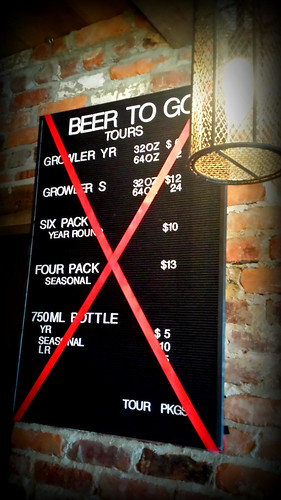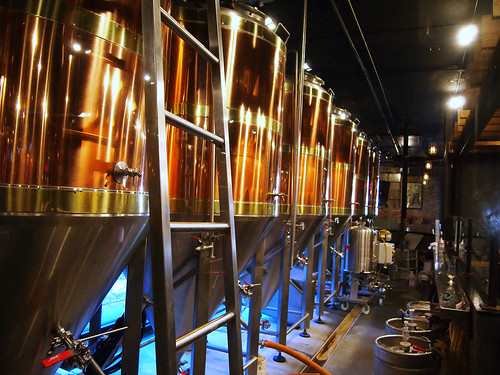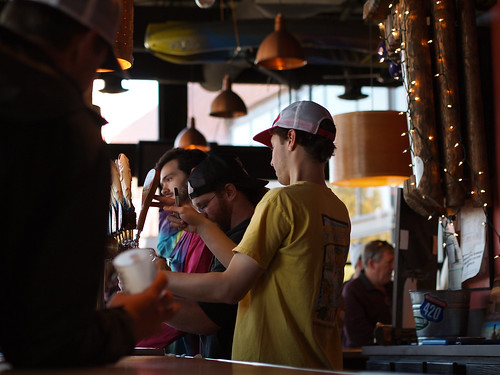Georgia and Mississippi* are the only two states remaining in the United States which still forbid direct-to-consumer sales at breweries.
Early in 2015, however, Georgia breweries won a small, if somewhat goofy, victory when the state legislature passed a law allowing them to sell beer directly to customers who take brewery 'tours.' Nudge-nudge, wink-wink. The beer came as 'free souvenirs' during the 'tour' or as 'souvenirs' the attendees could take home with them.
As the brewers figured it, the cost of the beer would, of course, be worked into the price of the 'tour.' But, not so fast.
In September 2015, the Georgia Department of Revenue reinterpreted the law. It issued a bulletin declaring that a brewery's 'tour' prices could NOT be based on the value of the beer given during a tour and that those tours could only include a limited amount of 'free' beer at the end: up to thirty-six fluid ounces of free malt beverage to each tour attendee in a calendar day in free tastings, and up to seventy-two ounces of beer as a free souvenir.
After a backlash —including statements from legislators that the DoR's re-interpretation was not what the legislature had intended— the Department relented in early 2016 and reestablished the bill's original intent. But the requirement of a ‘tour’ fiction and the prohibitions on per-pint pours in a brewery taproom and on brewery beer sales out-the-door remained.
Which brings us to Monday’s action by the Georgia House of Representatives (and the earlier vote of the Georgia Senate, on 2 February):
Press release from the Georgia Craft Brewers Guild
Monday, 13 March 2017The 2017 Georgia House of Representatives voted today in favor of legislation to allow consumers to purchase beer or spirits directly at the brewery or distillery where they are made. Senate Bill 85, authored by Senator Rick Jeffares (R-Locust Grove) and carried in the House by Representative Howard Maxwell (R-Dallas), passed with vote of 147 to 14.
“This legislation is a victory for small businesses across our state from Blue Ridge to the Golden Isles,” said Speaker of the House David Ralston (R-Blue Ridge). “I appreciate all of the stakeholders coming together and working out a solution that empowers our craft brewers and distillers to create more jobs. As Georgia’s economy continues to grow and new industries and entities enter the marketplace, this legislation will serve as an example of how to move forward in a positive and mutually-beneficial way.”
Throughout the summer and fall of 2016, business leaders from craft breweries and their wholesale partners met to discuss common sense updates to benefit the beer industry in Georgia. “With suggestions championed by both brewers and wholesalers, Speaker of the House David Ralston (R-Blue Ridge), Lieutenant Governor Casey Cagle, House Regulated Industries Committee Chairman Howard Maxwell, and Senator Rick Jeffares have provided guidance to create this legislation. Their commitment to supporting the small businesses of Georgia shines through in SB85,” said Nancy Palmer, Executive Director of the Georgia Craft Brewers Guild.
In the House Regulated Industries Committee, under the guidance of Chairman Howard Maxwell, Representative Ron Stephens, and Representative Alan Powell, SB85 was modified to represent the terms of a compromise reached by the Georgia Distillers Association and the Wine and Spirit Wholesalers of Georgia. With the new language added, visitors to breweries and distilleries will be able to sample products by the glass, take up to three 750 ml bottles of spirits or one case of beer-to-go, and purchase food without the current tour and tasting requirements. Both distilleries and breweries will be subject to an annual sales cap of 500 and 3000 barrels respectively. Furthermore, the bill slightly modifies the brewpub license to reinforce local control on issues of to-go sales from brewpubs.
According to Palmer, the Georgia Beer Wholesalers Association and the Georgia Municipal Association are also due credit. “The wholesalers of Georgia and our allies in cities across this state have been crucial in this process.”
Having found common ground with his counterparts in the industry, Chris Sywassink of Ghost Coast Distillery and the Georgia Distillers Association added, “We’re grateful to our wholesale and retail partners for the time they have spent working with us in a spirit of cooperation for the last year. And we’re fortunate that leadership within the Georgia legislature has created an environment that encouraged compromise and communication. The GDA is especially indebted to Speaker David Ralston, Chairman Howard Maxwell and Chairman Ron Stephens for their time, energy, encouragement and tireless efforts over the past 2 years.”
Here’s more about the vote, from the Savannah Morning News (13 March 2017):
Breweries and distilleries in Georgia this week are toasting the state House of Representatives’ passage of legislation that will let them sell their beverages straight to consumers.
The Georgia House voted 147-41 on Monday to adopt an amended version of Senate Bill 85, which will provide for distillers and brewers in the state to sell a set amount of barrels of their products directly to the public each year. The state Senate passed its version of the legislation in a 49-2 vote on Feb. 2.
There’s [sic] still a few more steps to go before the bill goes into effect. Because the legislation was amended to add in the language for distilleries, the bill needs to be agreed upon by the state Senate before it heads to Gov. Nathan Deal for his signature. If the governor signs the legislation, it would go into effect Sept. 1.
As passed by the House on Monday, the bill allows for distilleries in Georgia to sell up to 500 barrels and brewers to sell as much as 3,000 barrels of their product on the premises each year. Previously, these companies were required to sell only tours of their facilities and then offer free samples during limited hours each week.
Carly Wiggins [marketing and sales director for Savannah’s Southbound Brewing Co. and sitting president and membership chair of the Georgia Craft Brewers Guild] said the new law would be more than just a boon for breweries, which take, on average, five years to break even. While breweries will be able to generate more revenue through direct beer sales, the state will also benefit from brewery tourism and from an additional, taxable revenue stream.
There would be one more issue for state officials and local brewers to address once the legislation crosses the governor’s desk, said Kevin Ryan, CEO of Service Brewing Co. in Savannah. If the law passes, Ryan said, the next step would be to see how the Georgia Department of Revenue decides to interpret it. In the past, he pointed out, the Department of Revenue’s interpretation of Georgia’s beer laws has fluctuated, which has emphasized the importance of clear and concise legislation. Assuming, however, that the interpretation matches the major points in the bill, Ryan said, he’s happy about the prospects for Georgia.
The executive director of the Georgia Craft Brewers Guild, Nancy Palmer, said she’s been tracking more than 80 prospective brewing companies that have expressed an interest in opening in the Peach State if the legislation passes. “If just two-thirds of these breweries come to fruition, Palmer said Monday, it would more than double the 50 breweries currently operating in Georgia.”
On the distillery front, meanwhile, the benefits should be similar to those for Georgia’s breweries, said state Rep. Ron Stephens, R-Savannah, one of the authors of the distillery legislation. “What passed in the state House Monday essentially dismantles a long-standing shell game the state has played to appease critics over the years, Stephens said. “Now you can directly sell a limited amount,” he said. “It is still a limited amount but it is a huge victory for distillers and brewers. It’s going to help everybody. Once people find the product, they’re going to want to go to the retailer and buy the product. … When you’re looking at a tourist town like Savannah, where tourism is the No. 1 industry, this is a big deal.”
Chris Sywassink, owner of Savannah’s Ghost Coast Distillery and a member of the Georgia Distillers Association, said there are 17 distilleries operating in Georgia today, but he expects that number to double in the next few years if the legislation is ultimately signed by the governor.
What it all means
A barrel of a beer is not a physical container; it's a unit of measurement equal to thirty-one U.S. gallons (and, in fact, defined as such by the legislature in this bill). Thirty-one gallons is the equivalent of two hundred forty-eight 16-ounce pints. Senate Bill 85, if signed into law, will permit a Georgia brewery to sell three thousand barrels of beer per year to customers in its taproom. Doing the math, that's 744,000 16-ounce pints of beer.When it comes to spirits, however, the legislature defines a barrel as fifty-three U.S. gallons (a gallon more than twice a U.S. beer barrel). Thus, the 500-barrel limit that the legislature is granting for distillery taproom sales is worth more than it might seem.
The legislation also reaffirms that brewpubs are permitted to sell beer-to-go (think: growlers) where the brewpubs are permitted to do so by their county or municipality. And it allows production-breweries to sell growlers and/or packaged beer to go, up to a case of beer per day per customer (that is, twenty-four 12-ounce bottles or the equivalent of 288 fluid ounces).
Nancy Palmer, executive director of the Georgia Craft Brewers Guild, has calculated that there are currently fifty breweries in Georgia. And, she believes, there might be as many as eighty breweries that might open in the wake of SB85's hoped-for passage: a 160% growth spurt. But it might be even better than that. Beer Guys Radio list sixty-five breweries and brewpubs as operating in Georgia, and one cidery.
Of course, it'll all be moot
And thank the Georgia Craft Brewers Guild for its efforts; and (if you're a Georgia resident) encourage your representatives to vote yes; and, maybe, toss a few barleycorns over your left shoulder for good luck.
*****************
UPDATE Wednesday 22 March 2017:
Per GPB News, the Georgia Senate approved SB85, by a vote of 52-1 (amending it to include the distillery option added by the House). From here, the bill heads to Governor Nathan Deal. If he, as expected, signs it, the law will take effect on 1 September.
-----more-----
- This post in an update to a story originally published at YFGF on 26 January 2017.
- As of today (15 March), the Georgia Craft Brewers Guild had not posted its press release to its website. The text above was re-printed from a post on the website Ale Sharpton, blog of Dennis Malcolm Byron, a respected Antanta=based beer writer: Direct Sales from GA Breweries and Distilleries Gets [sic] Love in the ‘House’!
- *As to Mississippi, Draft Magazine reports:
House Bill 1322, which will permit breweries making fewer than 60,000 barrels of beer a year to sell bottles or cans directly to customers who visit the brewery, [passed today, 15 March] is headed to Gov. Phil Bryant to be signed
or vetoed. The bill would enable brewers [that produce 60,000 barrels or fewer] to sell up to two cases of beer per day to any one person, but would cap the total amount allowed for on-site sales each year at either 1,500 barrels or 10 percent of the total amount of beer produced at the brewery—whichever is lesser. At the Craft Brewers Conference in Washington, D.C. in early April, Matt McLaughlin, president of the Mississippi Brewers Guild received the 2017 F.X. Matt Defense of the Craft Brewing Industry Award from the [U.S.] Brewers Association in recognition of his successful efforts to change Mississippi laws. - References:
- Georgia House passes long-awaited brewery, distillery bill (Savannah Morning News, 13 March 2017).
- Text of Georgia House of Representatives version of SB 85 (pdf).
- Georgia Craft Brewers Guild: website. Facebook: georgiacraftbrewersguild/. Twitter: gabrewersguild. Instagram: gacraftbrewersguild
- Georgia Distillers Association.
- Beer Guys Radio (including a 'gal') podcast on beer in Georgia and Alabama. Their list of Georgia breweries: here.
- For more from YFGF:
- Follow on Twitter: @Cizauskas.
- Like on Facebook: YoursForGoodFermentables.
- Follow on Flickr: Cizauskas.
- Follow on Instagram: @tcizauskas.













No comments:
Post a Comment
Comment here ...